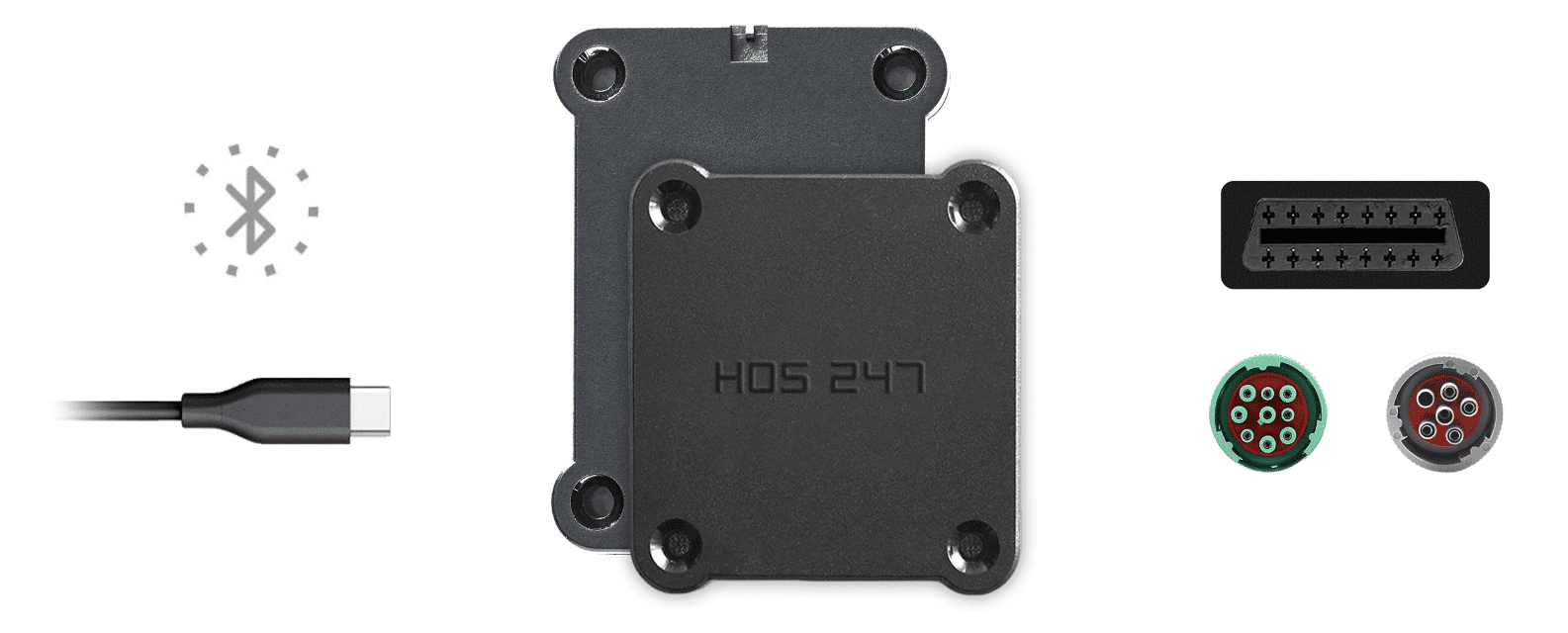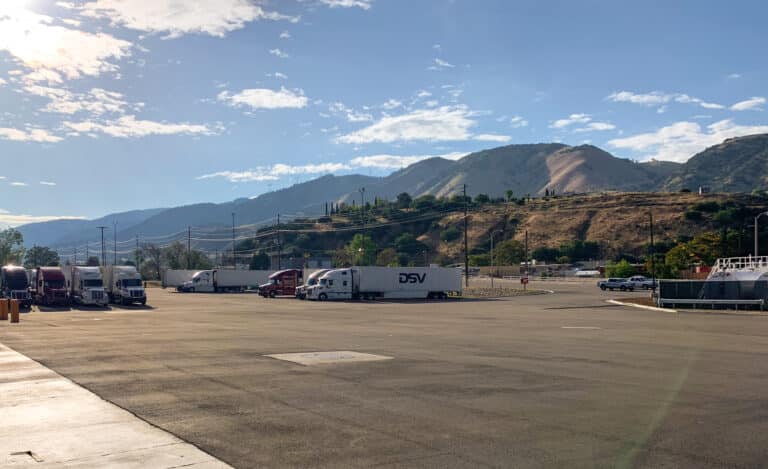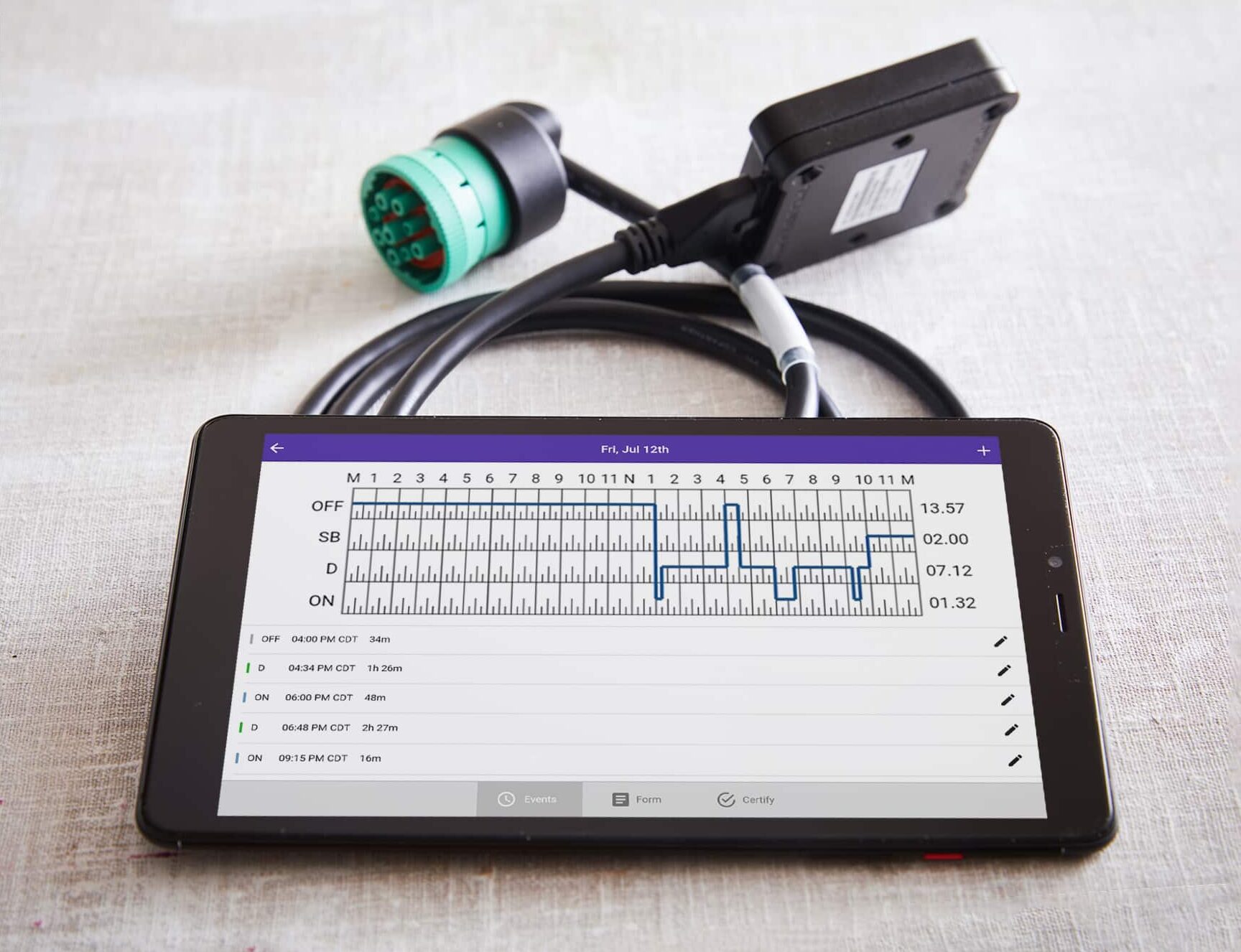GPS fleet tracking is a monitoring system installed in trucks to provide maximum fleet visibility, allowing motor carriers to manage their vehicles in real time. Using telematics technology, GPS fleet tracking hardware collects vehicle-related data and transmits it into the web-based fleet management portal.
With real-time information such as speed, fuel level, battery charge, idle time, and other important insights, fleet managers can make timely decisions and increase the overall productivity of operations, reducing costs, saving fuel and improving safety. In this article, we will discuss different types of fleet tracking hardware and how to choose the best tracking technology for your business.
Do you have any questions? Talk to ELD Advisor: 650-405-3372 or Request Callback
Types of GPS Trackers
Carriers might bet more out of certain tracking solutions depending on the size of their fleet, their budget, and other particular needs. There are mainly three types of GPS fleet tracking hardware used in the transportation industry to monitor vehicles. Let’s take a look.
Plug-In Trackers
Easy to set up and maintain, plug-in fleet tracking hardware is popular among truckers with many vehicles who need to move the tracker between them. The device is small and plugs into the vehicle’s electricity port. The main shortcoming of this GPS fleet tracking hardware is that the data is not easily accessible as the tracker can’t monitor location when the vehicle is turned off.
Hardwired Trackers
Unlike a plug-in tracker, this type of tracker is wired directly into the vehicle and can be hidden for security purposes. Being relatively cheap and easy to install, these devices are a popular choice among trackers. However, they are difficult to remove once installed, and they depend on the power of the vehicle, so the location data won’t be available when the vehicle is off.
Battery-Operated Trackers
Battery-operated GPS trackers are an excellent choice for those who always want to maintain sight of their vehicle. Since they run on their own battery power, these devices will continue tracking location even when the truck is shut off, helping recover the vehicle and assets in case of theft. The battery can last for weeks or months without maintenance. However, these trackers don’t update the location data as frequently as other types in order to save battery power.

GPS Fleet Tracking Hardware Installation
Installing GPS fleet tracking hardware is straightforward. Most devices install quickly without special tools or professional help, getting your fleet monitoring running in minutes. This section covers installation methods, best practices, troubleshooting tips, and the complete cost breakdown to help you make informed decisions.
Plug-in Device Installation
Plug-in trackers connect directly to your vehicle’s OBD-II port. This standard port is found in all vehicles made after 1996, usually under the dashboard on the driver’s side near the steering wheel. Sometimes it’s behind a small plastic cover.
Installation is simple — just plug the device into the port until it clicks. No wiring, no tools needed. Takes less than five minutes per vehicle.
Professional vs. DIY Installation
Hardwired trackers need to connect to your vehicle’s electrical system. They’re hidden from view for better security.
Professional installation ensures proper connections and takes 30-60 minutes per vehicle. If you’re comfortable with basic wiring, you can install it yourself to save time and money.
Installation Best Practices
Schedule installations during maintenance windows or when vehicles aren’t in use. Always turn off the vehicle before installing. Test the device right after setup to make sure it’s working.
Most devices have LED lights that show power and cell signal, making it easy to check if installation worked.
Troubleshooting Common Issues
Most installation problems are easy to fix. If your device isn’t sending data:
- Check if it’s plugged in firmly — loose connections are the most common issue.
- Look at the LED lights to confirm cell signal.
- Make sure you’ve registered and activated the device with your provider.
If you still have problems, your tracking provider’s support team can help.
With proper installation and basic troubleshooting knowledge, you can have your GPS tracking system up and running quickly. The simplicity of modern tracking devices means less downtime for your fleet and faster access to the valuable data that improves your operations.
Hardware Costs and Pricing Models
Understanding the complete financial picture of GPS fleet tracking requires examining both upfront hardware costs and ongoing operational expenses. The investment varies significantly based on device sophistication, service features, and the size of your fleet.
Hardware and Monthly Costs
Hardware costs typically range from $100 to $600 per unit, with basic plug-in trackers starting around $100-$200 and advanced hardwired units with additional sensors, battery backup, and enhanced security features reaching $300-$600. The price difference reflects the complexity and capabilities of each device type.
Monthly subscription fees generally span from $13.99 to $60 per vehicle, with basic location tracking on the lower end and comprehensive fleet management platforms including maintenance alerts, driver behavior monitoring, and detailed reporting commanding higher fees.
Contract Options
Contract versus no-contract options present different financial trade-offs that fleet operators should carefully consider. Contract plans typically offer lower monthly rates and subsidized or even free hardware in exchange for 12-24 month commitments, making them attractive for stable fleets with predictable needs.
No-contract options provide operational flexibility but usually require full hardware payment upfront and carry higher monthly fees, making them suitable for seasonal operators or those testing GPS tracking for the first time.
Hidden Costs to Consider
Beyond the obvious costs, several hidden expenses can impact your budget. Activation fees ranging from $25-$50 per device, data overage charges for high-frequency tracking, and early termination fees for contract plans can add unexpected costs. Some providers charge extra for advanced features like geofencing, maintenance scheduling, or integration with existing fleet management systems.
Always request a comprehensive cost breakdown and read the fine print before committing to any tracking solution.
Volume Discounts
Fleet size significantly impacts pricing, with operators managing 10 or more vehicles often qualifying for substantial volume discounts. These discounts typically reduce per-unit costs by 10-30% and may include additional benefits such as extended warranties, priority technical support, and custom integration services.
Larger fleets have negotiating power that can result in significant long-term savings, making it worthwhile to discuss volume pricing even if you’re planning fleet expansion rather than currently operating a large number of vehicles.
Choosing a GPS Fleet Tracking System
A system built on reliable GPS fleet tracking hardware may significantly improve your fleet operations. From reducing fuel costs and maintenance expenses to optimizing dispatch and boosting overall productivity, this multifunctional tool will provide you with the most crucial real-time data on vehicle performance.
Taking into account the positive impact that a GPS tracking system may have on fleet operations, here is a list of important factors to consider while choosing a tracking system.
- Compatibility. If you are an owner of a fleet that includes vehicles of different types, look for a device that can be compatible with all of your trailers and trucks. Otherwise, you will have to hire a separate provider for each vehicle class, increasing the cost and complicating maintenance and other post-sale issues.
- Easy installation. A complex installation process may lead to downtime and extra expenses. Before deciding on anything, ensure that you or your employees can install it without the intervention of a specialist.
- Real-time tracking. To take advantage of all perks of the system, you should choose a solution that offers a real-time tracking option. Knowing the exact location of your vehicles can give you better control over operations, improving dispatch, security and the quality of the services you provide to customers.
- 4G technology. As the 4G network is ten times faster than its 3G analog counterpart, it allows motor carriers to monitor your vehicles and assets with more accuracy.
- Efficient technical support. Even if the system has a friendly interface and is easy to use, you can still have questions related to troubleshooting or the everyday use of the device. Make sure that an accessible and knowledgeable technical support team backs up your tracking system. An excellent way to find out about it is by checking user reviews on independent digital platforms, such as the App Store and Google Play.
- Demo or trial period. A reliable provider will always offer a trial for you to test their solution. Ask for a demo to familiarize yourself with the system and make the right decision.
- ELD-integration. If your vehicles are engaged in interstate commerce, an electronic logbook might be required to ensure FMCSA compliance. An ELD-based GPS system can be a great way to maximize your investment.

HOS247 Truck Tracking Devices
HOS247 offers ELD-integrated and 24/7 monitoring hardwired solutions. None of them requires special installation and can be set up within several minutes. The ELD-integrated device can be installed by plugging it into the OBD II port. Accurately recording driving time, ELD-integrated devices help motor carriers achieve compliance with FMCSA regulations and improve their CSA scores.
The hardwired tracker connects to the vehicle’s ignition and it has an extra battery to achieve 24/7 real-time monitoring even while the vehicle is turned off. Equipped with a sim card, it has a strong 4G connection receiver that will function in remote areas and poor weather conditions. Our trackers collect the GPS coordinates between 30 seconds and 2 minutes when the vehicle is in motion, allowing fleet managers to track current and past locations on the route. Having excellent connectivity to peripheral devices, they analyze areas of opportunity, providing motor carriers with more in-depth insights into operational performance.

Benefits of HOS247 GPS Fleet Tracking Hardware
Empowered with the latest technology to smoothen your fleet’s operations and help you achieve maximum efficiency, the HOS247 fleet tracking system can bring plenty of benefits to your business. Among the advantages you will enjoy using the HOS247 tracker are:
- Cost savings. Our idle reporting solution saves a considerable amount of money on fuel expenses. The system informs fleet managers about excessive speeding, idling, and other impractical driver behaviors through the web-based portal, allowing supervisors to make timely decisions and significantly reduce fuel waste.
- Increased fleet security. HOS247 GPS fleet tracking hardware can be hidden in vehicles to prevent tampering and for theft recovery purposes. The system will also notify the fleet manager’s office in case of an accident.
- Preventive maintenance. Features like vehicle diagnostics and fault code detection let fleet managers know when a vehicle is due for maintenance, automatically scheduling maintenance events and reducing the risk of costly repairs. The system ensures that your fleet stays compliant with safety guidelines.
- Simple installation and use. HOS247 GPS fleet tracking hardware is fast and easy to install. The carrier’s staff can set the system up in less than ten minutes following the manual’s instructions.
- Intuitive software. The online portal can be accessed through any standard internet browser and users require no training. It will be ready to use as soon as the fleet manager logs into the system.
- Improved customer service. Real-time tracking allows taking dispatch and other important fleet operations to a new level. Knowing the vehicle’s exact location, the dispatcher can route more efficiently and provide more accurate information to customers, considerably improving the quality of service. In addition, the system can protect drivers from false claims: the collected GPA data can be used to prove when a truck arrived at the site and when it left.
- ELD compliance. Integrated with a reliable electronic logging device, HOS247 GPS fleet tracking devices help truckers achieve compliance with the ELD rule, accurately recording driving time and facilitating HOS management and creation of inspection reports to avoid HOS violations and costly penalties.
HOS247 is a provider that has proved its reliability over the years, offering a fleet management service that helps improve operational efficiency, reduce costs at a minimum, and maintain compliance with safety and ELD regulations. Our 4G LTE technology makes sure the signal stays strong in any condition, providing real-time tracking of your vehicles and assets 24/7. If you need assistance, our excellent customer support is available Monday through Sunday to clarify your doubts and provide your crew with training if needed. We encourage you to book a demo to test our fleet management system and experience the benefits of HOS247.
From fuel savings and enhanced security to simplified compliance and improved customer service, our system addresses the real challenges truckers face daily. By choosing HOS247, you’re not just installing tracking hardware — you’re investing in a tool that streamlines operations, reduces costs, and helps your fleet run more efficiently and profitably.
ROI and Cost Savings Analysis for ELD-Integrated GPS Fleet Tracking
Understanding the financial impact of GPS fleet tracking helps truckers make informed investment decisions. Beyond the obvious benefits of vehicle location services, ELD-integrated systems create value through multiple cost-saving channels that directly improve profitability.

The Value of Dual-Purpose Technology
Running separate ELD and GPS systems creates unnecessary complexity and expense. ELD-integrated GPS tracking combines both functions into one device, eliminating duplicate monthly fees and reducing hardware costs. Fleet managers work with a single platform instead of juggling multiple systems. This means one vendor relationship, simplified billing, and less dashboard clutter. For owner-operators watching every dollar, consolidating these essential tools makes financial sense.
Compliance-Related Savings
The true cost of violations extends beyond fines. When drivers get placed out of service for logbook errors, everyone loses money — lost productivity, delayed deliveries, and damaged customer relationships. ELD-integrated tracking helps maintain accurate logs automatically, reducing honest mistakes that lead to violations. Electronic logs also speed up roadside inspections, getting drivers back on the road faster. While no system guarantees violation-free operations, reliable technology significantly reduces risk and protects your CSA score.
Operational Cost Reductions
GPS tracking reveals hidden money drains in daily operations. Excessive idling burns fuel unnecessarily, while inefficient routing adds miles and wear to equipment. Real-time monitoring identifies these issues, allowing immediate corrections. When drivers know their performance is tracked, behavior often improves without confrontation. The data enables better decision-making — from optimizing routes to reducing unauthorized vehicle use. Small improvements across multiple areas create substantial savings over time.
Insurance and Tax Benefits
Many insurers offer premium discounts for GPS-equipped fleets, recognizing the reduced risk profile. Beyond potential discounts, tracking data provides crucial evidence during accident claims, potentially saving thousands in disputes. Automated mileage logs ensure accurate tax deductions without manual paperwork. Some truckers discover they’ve been underreporting business miles for years, missing legitimate deductions.
ROI Calculation Example
10-Truck Fleet Investment:
- Monthly cost: $35/vehicle × 10 trucks = $350/month.
- Annual subscription: $4,200.
- Hardware cost (first year only): $2,000.
- Total Year 1 Investment: $6,200.
Annual Savings:
- Fuel reduction (15% of $150,000): $22,500.
- Overtime reduction (20% of $50,000): $10,000.
- Insurance discount (10% of $30,000): $3,000.
- Avoided violations: $5,000.
- Total Annual Savings: $40,500.
ROI: 553% first year, 864% subsequent years Payback period: 2-4 months.

Conclusion
GPS fleet tracking has evolved from optional technology to essential equipment for competitive trucking operations. The integration of ELD compliance with advanced tracking capabilities delivers measurable returns through fuel savings, reduced violations, and operational efficiency improvements.
Whether operating a single truck or managing a large fleet, the right tracking system transforms daily operations while ensuring regulatory compliance. With typical first-year returns exceeding 500%, GPS tracking represents one of the fastest-paying investments in trucking technology.
HOS247 offers proven ELD-integrated GPS solutions with transparent pricing, no-contract flexibility, and comprehensive support. Our systems help truckers reduce costs, maintain compliance, and operate more efficiently in today’s demanding transportation environment. Experience the operational advantages that professional-grade fleet tracking delivers — because in modern trucking, the right technology isn’t just helpful, it’s essential for sustainable success.

I’ve co-founded, built and managed several transportation-related businesses. Now, I’m a founder and CEO of HOS247 – an AI Transportation Platform for trucking companies, freight brokers and other logistics operations. We are transitioning old-style operations to technology-advanced logistics entities and help them to grow their businesses. ELDs (electronic logging devices), fleet tracking and management 2.0 combined with AI-powered dispatch tools.












Fleet managers constantly face increasing demands to enhance operational efficiency, ensure safety, and reduce costs. GPS fleet tracking software gives fleet managers the ability to keep track of every vehicle in their fleets in real time. But it isn’t just

Today no business associated with vehicles will do without smart fleet management. A combination of hardware and software includes, among other things, various vehicle tracking and maintenance systems. Maintenance scheduling, unnecessary driving/idling time reduction, and accurate record help to minimize

The ELD Mandate is a fact of life for most drivers and trucking companies. This article presents some guidelines on how to choose ELD devices, how to stay on top of a trucking company and driver regulatory needs, who must
